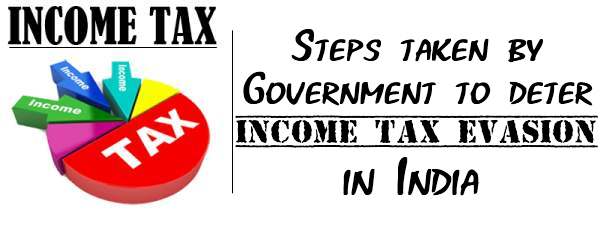Steps taken by Government to deter Income Tax Evasion in India
Table of Contents
Steps taken by Government to deter Income Tax Evasion in India
Government has introduced a number of measures to deter tax evasion in India. Such measures are briefly explained below.

1. Statutory Provisions
There are certain statutory provisions like compulsory filing of tax returns by everyone with a taxable income; compulsory maintenance of accounts by businessmen and professionals and their compulsory auditing if income or turnover exceeds a specified limit and compulsory canalizing of transactions involving payment exceeding Rs.20, 000 through banks.
2. Conduct of Surveys
There are surveys conducted by the income tax department to bring new assessees into the tax net and also to strengthen the information base for the detection of tax evasion by existing assessees.
3. Drastic Measures
At times the Government has even used drastic measures like tax raids and seizures.
4. Penalties and Prosecution
To discourage tax evasion, tax laws provide for monetary penalties and for the prosecution (and imprisonment) of tax evaders.
5. Provisions relating to Door-to-door Market Survey u/s 133 B
The jurisdictional income tax authority may collect certain information, including tax status of assessees in order to find out new assessees. The surveyed person has to furnish information under prescribed form no 45 D. The income tax authorities are barred from removing any valuable or books of accounts etc. from such surveyed premises.
6. Special Procedure for Assessment of Search Cases
With effect from 01-07-1995, special procedure for assessment of search cases has been prescribed in chapter XIV – B of the I.T. Act. Broadly, this scheme envisages assessment of a Block Period consisting of ten years preceding the year in which search was conducted and the period till the date of search tax at 60% is charged on undisclosed income relating to the block period.
The block assessment has to be made within two years from the end of the month in which searches were completed. No penalty is leviable on undisclosed income that is now disclosed by the assessee, and on which full taxes have been paid/adjusted before filing of the return for the block period. However, delay in filing the return of block period, delay/non-payment of tax now due or failure to disclose fully the income that was hitherto undisclosed shall lead to levy of interest/penalty u/s 158 BFA.
How effective were the measures?
In practice, very few measures have effect. The statutory provisions have little effect because the self-employed (professionals and small businessmen) continue to escape the tax net, either by not filing returns or filing false returns.
The number of surveys has increased over the years but the performance has been poor. The surveys are poorly planned and there is corruption and inefficiency among the staff. Even the use of raids and seizures has not been very effective. Defective planning and execution of these measures, as well as excessive delay in the adoption of the follow up measures, are responsible for this.
The ineffectiveness of these measures makes the tax evaders bolder than before. As far as penalties and prosecutions are concerned, till date these have been imposed on a small proportion only.


